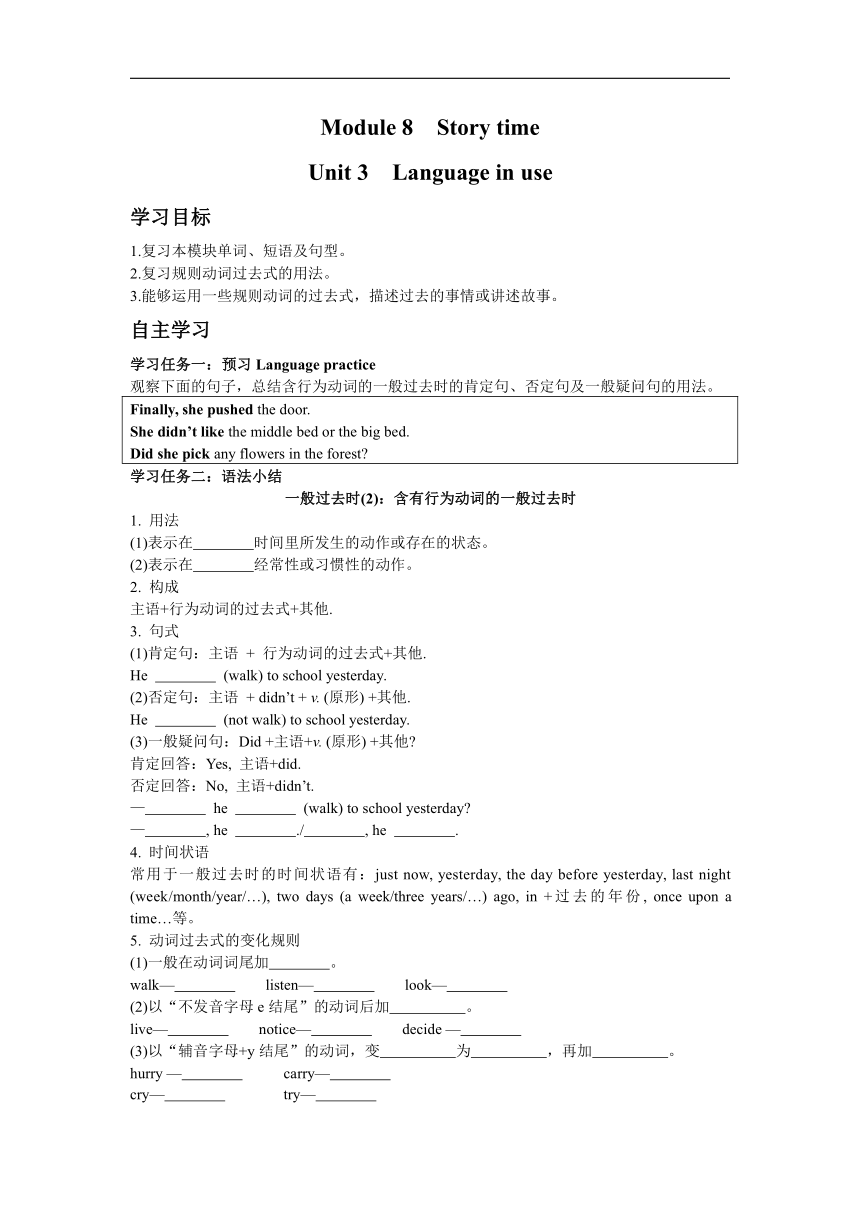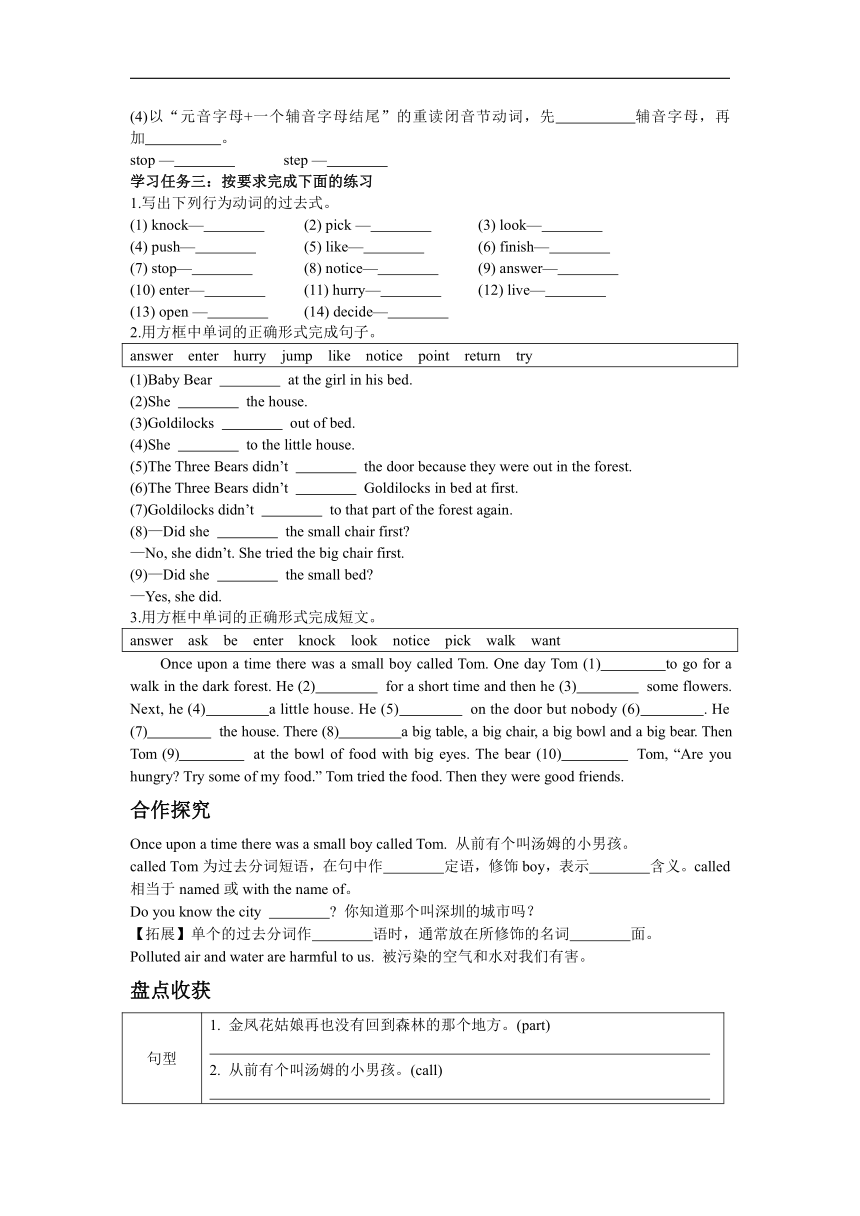Module 8 Unit 3同步学案-外语教研版中学英语七年级下
文档属性
| 名称 | Module 8 Unit 3同步学案-外语教研版中学英语七年级下 |

|
|
| 格式 | docx | ||
| 文件大小 | 35.1KB | ||
| 资源类型 | 试卷 | ||
| 版本资源 | 外研版 | ||
| 科目 | 英语 | ||
| 更新时间 | 2024-02-21 19:17:34 | ||
图片预览


文档简介
Module 8 Story time
Unit 3 Language in use
学习目标
1.复习本模块单词、短语及句型。
2.复习规则动词过去式的用法。
3.能够运用一些规则动词的过去式,描述过去的事情或讲述故事。
自主学习
学习任务一:预习Language practice
观察下面的句子,总结含行为动词的一般过去时的肯定句、否定句及一般疑问句的用法。
Finally, she pushed the door. She didn’t like the middle bed or the big bed. Did she pick any flowers in the forest
学习任务二:语法小结
一般过去时(2):含有行为动词的一般过去时
1. 用法
(1)表示在 时间里所发生的动作或存在的状态。
(2)表示在 经常性或习惯性的动作。
2. 构成
主语+行为动词的过去式+其他.
3. 句式
(1)肯定句:主语 + 行为动词的过去式+其他.
He (walk) to school yesterday.
(2)否定句:主语 + didn’t + v. (原形) +其他.
He (not walk) to school yesterday.
(3)一般疑问句:Did +主语+v. (原形) +其他
肯定回答:Yes, 主语+did.
否定回答:No, 主语+didn’t.
— he (walk) to school yesterday
— , he ./ , he .
4. 时间状语
常用于一般过去时的时间状语有:just now, yesterday, the day before yesterday, last night (week/month/year/…), two days (a week/three years/…) ago, in +过去的年份, once upon a time…等。
5. 动词过去式的变化规则
(1)一般在动词词尾加 。
walk— listen— look—
(2)以“不发音字母e结尾”的动词后加 。
live— notice— decide —
(3)以“辅音字母+y结尾”的动词,变 为 ,再加 。
hurry — carry—
cry— try—
(4)以“元音字母+一个辅音字母结尾”的重读闭音节动词,先 辅音字母,再加 。
stop — step —
学习任务三:按要求完成下面的练习
1.写出下列行为动词的过去式。
(1) knock— (2) pick — (3) look—
(4) push— (5) like— (6) finish—
(7) stop— (8) notice— (9) answer—
(10) enter— (11) hurry— (12) live—
(13) open — (14) decide—
2.用方框中单词的正确形式完成句子。
answer enter hurry jump like notice point return try
(1)Baby Bear at the girl in his bed.
(2)She the house.
(3)Goldilocks out of bed.
(4)She to the little house.
(5)The Three Bears didn’t the door because they were out in the forest.
(6)The Three Bears didn’t Goldilocks in bed at first.
(7)Goldilocks didn’t to that part of the forest again.
(8)—Did she the small chair first
—No, she didn’t. She tried the big chair first.
(9)—Did she the small bed
—Yes, she did.
3.用方框中单词的正确形式完成短文。
answer ask be enter knock look notice pick walk want
Once upon a time there was a small boy called Tom. One day Tom (1) to go for a walk in the dark forest. He (2) for a short time and then he (3) some flowers. Next, he (4) a little house. He (5) on the door but nobody (6) . He
(7) the house. There (8) a big table, a big chair, a big bowl and a big bear. Then Tom (9) at the bowl of food with big eyes. The bear (10) Tom, “Are you hungry Try some of my food.” Tom tried the food. Then they were good friends.
合作探究
Once upon a time there was a small boy called Tom. 从前有个叫汤姆的小男孩。
called Tom为过去分词短语,在句中作 定语,修饰boy,表示 含义。called相当于named或with the name of。
Do you know the city 你知道那个叫深圳的城市吗?
【拓展】单个的过去分词作 语时,通常放在所修饰的名词 面。
Polluted air and water are harmful to us. 被污染的空气和水对我们有害。
盘点收获
句型 1. 金凤花姑娘再也没有回到森林的那个地方。(part) 2. 从前有个叫汤姆的小男孩。(call)
续表
句型 3. 这些故事令人兴奋,孩子们喜欢一遍遍地听。(enjoy) 4. 这些故事通常以“从前……”开头。(begin with)
语法 含有行为动词的一般过去时的用法
当堂达标
Ⅰ. 单项填空。
1. Yesterday, Mom me some money to buy a dictionary.
A. gives B. gave C. is giving D. will give
2. He this city when he was eighteen.
A. leaves B. doesn’t leave
C. left D. is leaving
3. —Did he visit the park yesterday afternoon
— . He was on the farm with his father.
A. Yes, he did B. No, he didn’t C. Yes, he does D. No, he doesn’t
4. She some strawberries on the farm last weekend. That was interesting.
A. made B. took C. put D. picked
5. —Do you enjoy a volunteer
—If you want this, you’d better join us.
A. being; knowing B. to be; knowing
C. being; to know D. to be; to know
Ⅱ. 用所给词语的适当形式填空。
1. The old man (die) last night.
2. Tom (finish) all the food in his bowl.
3. My little sister (cry) and (shout) loudly when she saw the rat.
4. I (not notice) that strange man over there.
5. The boy (call) Tom is my good friend.
Ⅲ. 句型转换(每空一词)。
1. They watched a football match last Friday in Jinan. (改为否定句)
They a football match last Friday in Jinan.
2. She hurried to the bank near her home. (改为同义句)
She went to the bank near her home .
3. My father gave the bike back to his friend last night. (改为同义句)
My father the bike his friend last night.
4. Jack visited his grandparents at this weekend. (对画线部分提问)
Jack his grandparents
5. He often plays football with his friends after school. (用yesterday改写句子)
He with his friends after school yesterday.
学后反思
当堂达标参考答案:
Ⅰ. 1. B 由yesterday (昨天)可知,此处应用一般过去时,give的过去式为gave。句意:昨天妈妈给了我一些钱去买一本词典。
2. C 由when he was eighteen (当他18岁时)可知,此处应用一般过去时,leave的过去式为left。句意:他十八岁时就离开了这个城市。
3. B 根据“Did he visit the park yesterday afternoon ”可知,此处是一般过去时,根据“He was on the farm with his father.”可知,他和他父亲在农场,因此没有去公园,用否定回答。
4. D 根据on the farm可知,她是在农场里摘草莓,故选D。
5. C enjoy doing sth.喜欢做某事;want to do sth.想要做某事。
Ⅱ. 1. died 2. finished 3. cried; shouted 4. didn’t notice 5. called
Ⅲ. 1. didn’t watch 2. in a hurry 3. returned; to 4. When did; visit 5. played football
Unit 3 Language in use
学习目标
1.复习本模块单词、短语及句型。
2.复习规则动词过去式的用法。
3.能够运用一些规则动词的过去式,描述过去的事情或讲述故事。
自主学习
学习任务一:预习Language practice
观察下面的句子,总结含行为动词的一般过去时的肯定句、否定句及一般疑问句的用法。
Finally, she pushed the door. She didn’t like the middle bed or the big bed. Did she pick any flowers in the forest
学习任务二:语法小结
一般过去时(2):含有行为动词的一般过去时
1. 用法
(1)表示在 时间里所发生的动作或存在的状态。
(2)表示在 经常性或习惯性的动作。
2. 构成
主语+行为动词的过去式+其他.
3. 句式
(1)肯定句:主语 + 行为动词的过去式+其他.
He (walk) to school yesterday.
(2)否定句:主语 + didn’t + v. (原形) +其他.
He (not walk) to school yesterday.
(3)一般疑问句:Did +主语+v. (原形) +其他
肯定回答:Yes, 主语+did.
否定回答:No, 主语+didn’t.
— he (walk) to school yesterday
— , he ./ , he .
4. 时间状语
常用于一般过去时的时间状语有:just now, yesterday, the day before yesterday, last night (week/month/year/…), two days (a week/three years/…) ago, in +过去的年份, once upon a time…等。
5. 动词过去式的变化规则
(1)一般在动词词尾加 。
walk— listen— look—
(2)以“不发音字母e结尾”的动词后加 。
live— notice— decide —
(3)以“辅音字母+y结尾”的动词,变 为 ,再加 。
hurry — carry—
cry— try—
(4)以“元音字母+一个辅音字母结尾”的重读闭音节动词,先 辅音字母,再加 。
stop — step —
学习任务三:按要求完成下面的练习
1.写出下列行为动词的过去式。
(1) knock— (2) pick — (3) look—
(4) push— (5) like— (6) finish—
(7) stop— (8) notice— (9) answer—
(10) enter— (11) hurry— (12) live—
(13) open — (14) decide—
2.用方框中单词的正确形式完成句子。
answer enter hurry jump like notice point return try
(1)Baby Bear at the girl in his bed.
(2)She the house.
(3)Goldilocks out of bed.
(4)She to the little house.
(5)The Three Bears didn’t the door because they were out in the forest.
(6)The Three Bears didn’t Goldilocks in bed at first.
(7)Goldilocks didn’t to that part of the forest again.
(8)—Did she the small chair first
—No, she didn’t. She tried the big chair first.
(9)—Did she the small bed
—Yes, she did.
3.用方框中单词的正确形式完成短文。
answer ask be enter knock look notice pick walk want
Once upon a time there was a small boy called Tom. One day Tom (1) to go for a walk in the dark forest. He (2) for a short time and then he (3) some flowers. Next, he (4) a little house. He (5) on the door but nobody (6) . He
(7) the house. There (8) a big table, a big chair, a big bowl and a big bear. Then Tom (9) at the bowl of food with big eyes. The bear (10) Tom, “Are you hungry Try some of my food.” Tom tried the food. Then they were good friends.
合作探究
Once upon a time there was a small boy called Tom. 从前有个叫汤姆的小男孩。
called Tom为过去分词短语,在句中作 定语,修饰boy,表示 含义。called相当于named或with the name of。
Do you know the city 你知道那个叫深圳的城市吗?
【拓展】单个的过去分词作 语时,通常放在所修饰的名词 面。
Polluted air and water are harmful to us. 被污染的空气和水对我们有害。
盘点收获
句型 1. 金凤花姑娘再也没有回到森林的那个地方。(part) 2. 从前有个叫汤姆的小男孩。(call)
续表
句型 3. 这些故事令人兴奋,孩子们喜欢一遍遍地听。(enjoy) 4. 这些故事通常以“从前……”开头。(begin with)
语法 含有行为动词的一般过去时的用法
当堂达标
Ⅰ. 单项填空。
1. Yesterday, Mom me some money to buy a dictionary.
A. gives B. gave C. is giving D. will give
2. He this city when he was eighteen.
A. leaves B. doesn’t leave
C. left D. is leaving
3. —Did he visit the park yesterday afternoon
— . He was on the farm with his father.
A. Yes, he did B. No, he didn’t C. Yes, he does D. No, he doesn’t
4. She some strawberries on the farm last weekend. That was interesting.
A. made B. took C. put D. picked
5. —Do you enjoy a volunteer
—If you want this, you’d better join us.
A. being; knowing B. to be; knowing
C. being; to know D. to be; to know
Ⅱ. 用所给词语的适当形式填空。
1. The old man (die) last night.
2. Tom (finish) all the food in his bowl.
3. My little sister (cry) and (shout) loudly when she saw the rat.
4. I (not notice) that strange man over there.
5. The boy (call) Tom is my good friend.
Ⅲ. 句型转换(每空一词)。
1. They watched a football match last Friday in Jinan. (改为否定句)
They a football match last Friday in Jinan.
2. She hurried to the bank near her home. (改为同义句)
She went to the bank near her home .
3. My father gave the bike back to his friend last night. (改为同义句)
My father the bike his friend last night.
4. Jack visited his grandparents at this weekend. (对画线部分提问)
Jack his grandparents
5. He often plays football with his friends after school. (用yesterday改写句子)
He with his friends after school yesterday.
学后反思
当堂达标参考答案:
Ⅰ. 1. B 由yesterday (昨天)可知,此处应用一般过去时,give的过去式为gave。句意:昨天妈妈给了我一些钱去买一本词典。
2. C 由when he was eighteen (当他18岁时)可知,此处应用一般过去时,leave的过去式为left。句意:他十八岁时就离开了这个城市。
3. B 根据“Did he visit the park yesterday afternoon ”可知,此处是一般过去时,根据“He was on the farm with his father.”可知,他和他父亲在农场,因此没有去公园,用否定回答。
4. D 根据on the farm可知,她是在农场里摘草莓,故选D。
5. C enjoy doing sth.喜欢做某事;want to do sth.想要做某事。
Ⅱ. 1. died 2. finished 3. cried; shouted 4. didn’t notice 5. called
Ⅲ. 1. didn’t watch 2. in a hurry 3. returned; to 4. When did; visit 5. played football
同课章节目录
- Module 1 Lost and found
- Unit 1 Whose bag is this?
- Unit 2 Are they yours?
- Unit 3 Language in use
- Module 2 What can you do ?
- Unit 1 I can play the piano
- Unit 2 I can run really fast
- Unit 3 Language in use
- Module 3 Making plans
- Unit 1 What are you going to do at the weekends?
- Unit 2 We're going to cheer the players.
- Unit 3 Language in use
- Module 4 Life in the future
- Unit 1 Everyone will study at home
- Unit 2 Every family will have a small plane.
- Unit 3 Language in use
- Module 5 Shopping
- Unit 1 What can I do for you?
- Unit 2 You can buy everything on the Internet
- Unit 3 Language in use
- Module 6 Around town
- Unit 1 Could you tell me how to get to the Nationa
- Unit 2 The London Eye is on your right.
- Unit 3 Language in use
- Revision module A
- Module 7 My past life
- Unit 1 I was born in a small village.
- Unit 2 I was born in Quincy.
- Unit 3 Language in use
- Module 8 Story time
- Unit 1 Once upon a time….
- Unit 2 Goldilocks hurried out of the house.
- Unit 3 Language in use
- Module 9 Life history
- Unit 1 He left school and began work at the age of
- Unit 2 He decided to be an actor.
- Unit 3 Language in use
- Module 10 A holiday journey
- Unit 1 What did you do?
- Unit 2 This morning we took a walk.
- Unit 3 Language in use
- Module 11 Body language
- Unit 1 They touch noses!
- Unit 2 Here are some ways to welcome them.
- Unit 3 Language in use
- Module 12 Western music
- Unit 1 It's so beautiful!
- Unit 2 Vienna is the centre of European classical
- Unit 3 Language in use
- Revision module B
